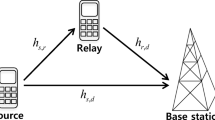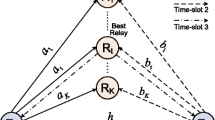Abstract
In this paper, an efficient cooperative transmission scheme with signal space diversity is proposed for two-user cooperative systems. In contrast with the conventional cooperative scheme based on orthogonal signaling, the proposed scheme obtains signal space diversity by utilizing rotated constellation. Because the proposed scheme provides much information to receiver in decoding process, a receiver can decode information more accurately. Therefore, the proposed scheme improves the bit error rate performance in severe fading channel environments. Simulation results demonstrate that the performance of the proposed scheme is especially superior to the performance of the conventional scheme in low inter-user channel quality.






Similar content being viewed by others
References
Nosratinia, A., Hunter, T. E., & Hedayat, A. (2004). Cooperative communication in wireless networks. IEEE Communications Magazine, 42(10), 74–80.
Pu, Y., Lin, C., & Tao, M. (2010). Rotating decode-and-forward two Pairs of two-way communications. Proc. IEEE GLOBECOM, pp. 1–5.
Kim, J.-H., Vasilakos, A. V., & Song, H.-K. (2011). Bandwidth-efficient space-time coded cooperation for resource-constrained networks. Wiley Wireless Communication and Mobile Computing, 11(10), 1358–1365.
Kim, J.-H., & Song, H.-K. (2007). Peformance improvement of cooperative MB-OFDM system based coming home network. IEEE Transactions Consumer Electronics, 53(2), 442–447.
Baek, M.-S., & Song, H.-K. (2009). Cooperative diversity technique for MIMO-OFDM uplink in wireless interactive broadcasting. IEEE Transactions Consumer Electronics, 54(4), 1627–1634.
Chen, H.-H., Sung, Y. L., Morales, A., & Agili, S. (2012). Cooperative communication with network coding. Proc. IEEE ISCE, pp. 1–3.
Pejanovic-Djurisic, M., Kocan, E., & Ilic-Delibasic, M. (2012). Cooperative relaying techniques for energy efficient wireless communications. Proc. international convention MIPRO, pp. 782–787.
Wang, J., Deng, K., & Yin, Q. (2011). Smart cooperation through orthogonal signaling and optimal power allocation. Proc. IEEE ICC, pp. 1–5.
Ko, S.-W., Kim, J.-H., & Song, H.-K. (2010). Cooperative OFDM system for high throughput in wireless personal area networks. IEEE Transactions Consumer Electronics, 56(2), 458–462.
Acknowledgments
This research was supported by Basic Science Research Program through the National Research Foundation of Korea(NRF) funded by the Ministry of Science, ICT and future Planning(No. 2013R1A2A2A01067708).
Author information
Authors and Affiliations
Corresponding author
Rights and permissions
About this article
Cite this article
Yu, SJ., Choi, WJ. & Song, HK. Smart Cooperative System Using Orthogonal Signaling with Signal Space Diversity. Wireless Pers Commun 83, 663–672 (2015). https://doi.org/10.1007/s11277-015-2415-1
Published:
Issue Date:
DOI: https://doi.org/10.1007/s11277-015-2415-1




